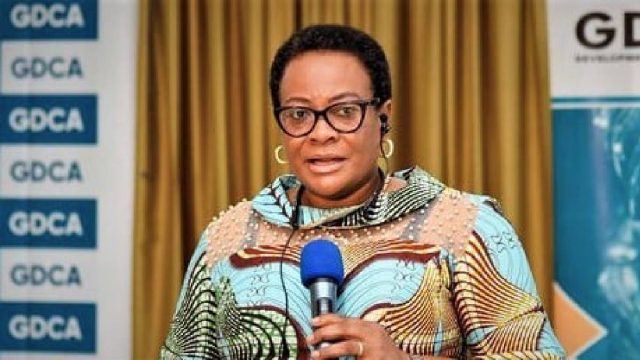The Executive Director of the Ghana Integrity Initiative (GII), –the local chapter of Transparency International (TI), Mary Awelana Addah, has told state bodies mandated to fight corruption to work within their limited resources to fight the menace.
She says it is important for the institutions to be seen to be tackling the corruption problem in the country if Ghana is to improve on its ranking on the corruption perception index.
“We must be seen to be working to encourage the citizens to blow the whistle with confidence. Our investigative bodies must work within the limited resources they have or the constraints,” Madam Addah said she said while speaking on the Key Points on TV3 on Saturday Febraury 3 regarding the Corruption Perceptions Index report by Transparency International, released on Tuesday, January 30, ranking Ghana in the 70th position out of 180 countries monitored.
Madam Addah further indicated that Ghana needs a Public Officers Conduct Bill that criminalizes conflict of interests and deals with the issue of unexplained wealth.
She stated that it is worrying to observe how some public officers acquire so much wealth when they get into office without anyone questioning the sources of their wealth.
“We don’t just need a public officer’s conduct bill, we are looking for a bill that criminalizes conflict of interest. We also need a bill that will ensure that the unexplained wealth saga is dealt with,” she said.
Earlier, Madam Addah insisted that the Corruption Perceptions Index (CPI) is an efficient way of measuring a government’s fight against the canker.
She says the notion that the CPI is merely a perception and does not reflect the real efforts being adopted by a government in curbing the menace, is erroneous.
Speaking on Ghana Tonight on TV3 Tuesday, January 30, 2024, following the release of the latest rankings, Madam Addah noted that those who hold the assertion that the CPI is not too efficient, do so depending on their political divide and how the result characterises their administration with regards to fighting corruption.
She said the assertion “does not suffice on several counts, because when you’re listening to a political narrative, it then goes to suit whoever it is affecting at any time. And so, people will say this is perception when they are in government. When they are out of government, they see the relevance of the CPI but that’s not surprising,” she indicated.
She continued that, “it is not surprising because we know these government officials appreciate the nuances and the discussion around corruption is one that is enabled either by legislation, by procedure, policy or by practice.”
The GII boss, however, bemoaned the challenges surrounding reporting on corruption which does not make it attractive for people to do so, and also for the fact that the act is usually covert.
“Unfortunately, the act of corruption is one that does not immediately bring about the issues around transparency. It’s because its hidden activity, people are hesitant to report because of the issues around reporting –either there are reprisals, people are seen as snitches or they tend to get seriously vilified for bringing out issues about corruption,” she pointed out.
She also said that the CPI constitutes various indices with a minimum of three and maximum of 12, with Ghana’s own comprising 9 surveys making up the indices. She continued that, the survey samples people with expertise where their consent on public sector corruption are sought, making it one of the most credible pieces of information anyone could gather about corruption.
“The CPI is an aggregate of various indices and in each country, you’ll realise that the least number of surveys that make it into the indices is about three and the highest is 12. So, out of these 12, Ghana alone had nine of them and I can tell you that these indices are based on credible information,” she noted.
For the fourth consecutive year, “Ghana scored 43 out of a clean score of 100 and ranked 70th out of 180 countries and territories included in the Corruption Perceptions Index (CPI) 2023 released on 30th January 2024 by Transparency International (TI). This marks the fourth consecutive year of stagnation in Ghana’s anti-corruption efforts, as indicated by the CPI.”
Ghana’s deteriorating justice system which is compromising accountability to grant public officials the liberty to thrive in corrupt activities, according to the Transparency International, is the reason for the country’s continuous stagnation.
“Under the theme for the CPI 2023 – Corruption and Justice, Ghana’s stagnated score highlights a global trend of deteriorating justice systems, which is reducing the accountability of public officials and therefore allowing corruption to thrive.
“The connection is reinforced by Ghana’s performance in the Rule of Law Index produced by the World Justice Project, which demonstrates a concerning decline. In the 2015 Rule of Law Index, Ghana scored 0.60 and ranked 34, but by 2023, Ghana’s score had decreased to 0.55, with a corresponding drop in ranking to 61.”
The Ghana Integrity Initiative is therefore recommending to Parliament to lay the Conduct of Public Officers’ Bill to situate the asset declaration at a position where verification would become compulsory, defining severe punishment for non-compliance.
“The Executive should urgently take steps to lay the Conduct of Public Officers’ Bill in Parliament ensuring that provisions on assets declaration require verification and come with severe sanctions for non-compliance while GII also calls on the Legislature to attach an equal level of urgency to its timely passage. The Executive and the Legislature must take steps to bridge the legal gaps necessary for the prosecution of selected corruption cases outside our current legal framework,” the GII recommended.









![Fuse ODG violently handcuffed, dragged out of his car by UK Police over alleged ‘Wee’ smell [Video]](https://ghananewss.com/storage/2023/05/Fuse-ODG-hand-100x75.jpeg)








